新概念英语3全真课堂
- 格式:pdf
- 大小:1.81 MB
- 文档页数:20
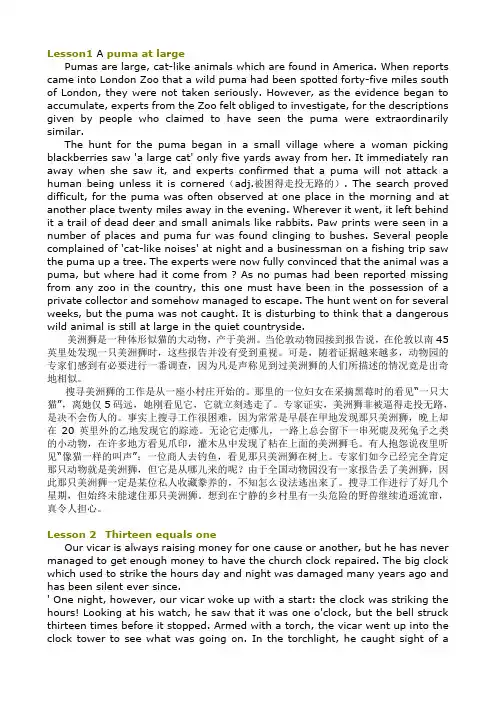
Lesson1 A puma at largePumas are large, cat-like animals which are found in America. When reports came into London Zoo that a wild puma had been spotted forty-five miles south of London, they were not taken seriously. However, as the evidence began to accumulate, experts from the Zoo felt obliged to investigate, for the descriptions given by people who claimed to have seen the puma were extraordinarily similar.The hunt for the puma began in a small village where a woman picking blackberries saw 'a large cat' only five yards away from her. It immediately ran away when she saw it, and experts confirmed that a puma will not attack a human being unless it is cornered(adj.被困得走投无路的). The search proved difficult, for the puma was often observed at one place in the morning and at another place twenty miles away in the evening. Wherever it went, it left behind it a trail of dead deer and small animals like rabbits. Paw prints were seen in a number of places and puma fur was found clinging to bushes. Several people complained of 'cat-like noises' at night and a businessman on a fishing trip saw the puma up a tree. The experts were now fully convinced that the animal was a puma, but where had it come from ? As no pumas had been reported missing from any zoo in the country, this one must have been in the possession of a private collector and somehow managed to escape. The hunt went on for several weeks, but the puma was not caught. It is disturbing to think that a dangerous wild animal is still at large in the quiet countryside.美洲狮是一种体形似猫的大动物,产于美洲。
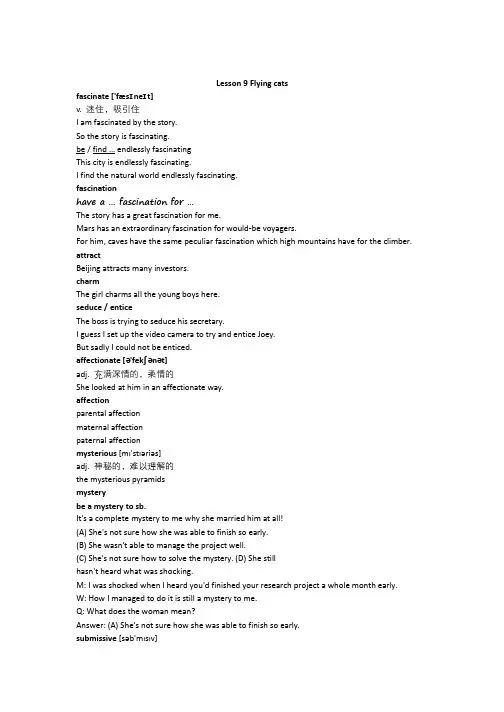
Lesson 9 Flying catsfascinate ['fæsɪneɪt]v. 迷住,吸引住I am fascinated by the story.So the story is fascinating.be / find … endlessly fascinatingThis city is endlessly fascinating.I find the natural world endlessly fascinating.fascinationhave a … fascination for …The story has a great fascination for me.Mars has an extraordinary fascination for would-be voyagers.For him, caves have the same peculiar fascination which high mountains have for the climber. attractBeijing attracts many investors.charmThe girl charms all the young boys here.seduce / enticeThe boss is trying to seduce his secretary.I guess I set up the video camera to try and entice Joey.But sadly I could not be enticed.affectionate [ə'fekʃənət]adj. 充满深情的,柔情的She looked at him in an affectionate way.affectionparental affectionmaternal affectionpaternal affectionmysterious [mɪ'stɪəriəs]adj. 神秘的,难以理解的the mysterious pyramidsmysterybe a mystery to sb.It's a complete mystery to me why she married him at all!(A) She's not sure how she was able to finish so early.(B) She wasn't able to manage the project well.(C) She's not sure how to solve the mystery. (D) She stillhasn't heard what was shocking.M: I was shocked when I heard you'd finished your research project a whole month early. W: How I managed to do it is still a mystery to me.Q: What does the woman mean?Answer: (A) She's not sure how she was able to finish so early.submissive [səb'mɪsɪv]adj. 服从的,顺从的He was looking for a quiet submissive wife who would obey his every word.submit to ...First, you must give Helen back to my brother. Second, Troy must submit to my command to fight for me whenever I call.yield to ...bow to ...succumb to ...The government refused to yield / bow / succumb to the terrorists.be subject to sth.All employees are subject to the regulations of the company.So let us begin anew—remembering on both sides that civility is not a sign of weakness, and sincerity is always subject to proof. Let us never negotiate out of fear, but let us never fear to negotiate.—John F. Kennedyfeline ['fi:laɪn]adj. 猫的She walks with feline grace.canine canine teethaquiline an aquiline noseporcine equinebovinebovine spongiform encephalopathy (BSE)mad cow diseasefeminine masculineindependence[ɪndɪ'pendəns]n. 独立,自主Independence DayIndia gained independence from Britain in 1947.be independent of ...His wages enabled him to become economically independent of his family.be dependent on ...They hate being dependent on their parents.So great is our passion for doing things for ourselves, that we are becoming increasingly less dependent on specialized labour.impact ['ɪmpækt]n. 冲击力,撞击;影响on impactThe glass smashed on impact.impact on / upon …His speech had a great impact on me.influence / effect on / upon …His head was hit by a falling stone heavily.He received a heavy hit on his head from a falling stone.When I came, he was just about to leave.My arrival coincided with his departure.never fail to do sth.My grandson never fails to phone me on my birthday.双重否定…, because there is no shortage of tall buildings.Nor is the city without its moments of beauty.It is not uncommon to hear that a shipping company has made a claim for the cost of salvaging a sunken ship.She did not fail to keep her word.Nobody is without his faults.Nothing is impossible to a willing mind.No one has nothing to contribute to society.I will never read books without falling asleep.Cats are endlessly fascinating.we find cats endlessly fascinating.be friendly to / towards …be affectionate towards …Why is he suddenly so friendly to / towards you?He is very affectionate towards his children.live / lead a … lifesing a songHe breathed his last breath.Liu Hulan died a glorious death.… of one’s ownI want a room of my own.as … as …(肯定)as / so … as …(否定/ 疑问)They never become as / so submissive as dogs and horses (do).in the (same) way that …We like them in the same way that we like pretty curtain material.Love me in the way that I love you.The city is living proof that the policy works in the way that economists claim.They never become submissive in the (same) way that dogs and horses do.(A) These things take time to learn.(B) Will you study any more?(C) Why do you keep on making the same mistakes?(D) It will be a good learning experience for you.When will you ever learn?Answer: (C) Why do you keep on making the same mistakes?independence humor honestysovereignty autonomythe Inner Mongolia Autonomous Regionbe suspicious of / about …He appeared suspicious.sceptical / skepticalbe ~ of / about …I’m highly skeptical of / about his motives.all one’s lifethroughout one’s lifefor life = for the rest of one’s lifeThe accident crippled him for life.lifelonga lifelong friendshipa lifelong undertakingOne of the things that fascinates us most about cats is the popular belief that they have nine lives.Jasper White is one of those rare people who believes in ancient myths.The Cutty Sark was one of the fastest sailing ships that has ever been built.John is the only one of the students in the class (A) that never (B) admit making a mistake even when (C) it is (D) pointed out to him.John is the only one of the students in the class (A) that never (B) admit making a mistake even when (C) it is (D) pointed out to him.John is the only one of the students in the class that never admits making a mistake even when it is pointed out to him.Those who work (the) most often get paid (the) least.造句:最令我们感到伤心(sadden) 的一件事是一种令人沮丧的说法(a depressing saying):每当我们在街上有麻烦或者有危险时没有人来帮助我们(come to our assistance)。
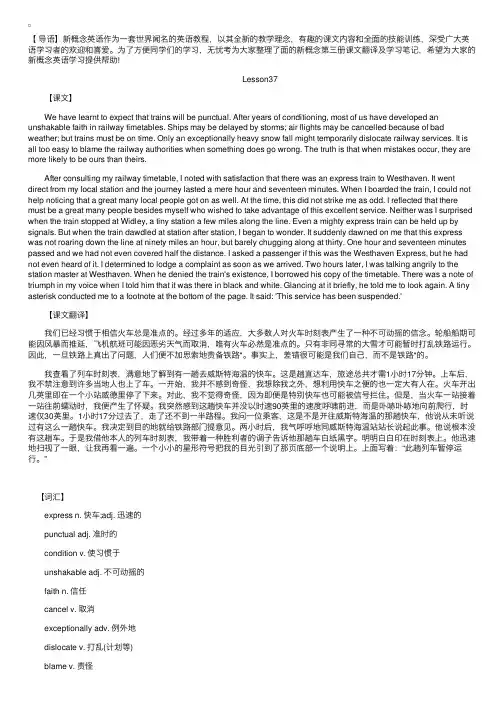
【导语】新概念英语作为⼀套世界闻名的英语教程,以其全新的教学理念,有趣的课⽂内容和全⾯的技能训练,深受⼴⼤英语学习者的欢迎和喜爱。
为了⽅便同学们的学习,⽆忧考为⼤家整理了⾯的新概念第三册课⽂翻译及学习笔记,希望为⼤家的新概念英语学习提供帮助!Lesson37 【课⽂】 We have learnt to expect that trains will be punctual. After years of conditioning, most of us have developed an unshakable faith in railway timetables. Ships may be delayed by storms; air flights may be cancelled because of bad weather; but trains must be on time. Only an exceptionally heavy snow fall might temporarily dislocate railway services. It is all too easy to blame the railway authorities when something does go wrong. The truth is that when mistakes occur, they are more likely to be ours than theirs. After consulting my railway timetable, I noted with satisfaction that there was an express train to Westhaven. It went direct from my local station and the journey lasted a mere hour and seventeen minutes. When I boarded the train, I could not help noticing that a great many local people got on as well. At the time, this did not strike me as odd. I reflected that there must be a great many people besides myself who wished to take advantage of this excellent service. Neither was I surprised when the train stopped at Widley, a tiny station a few miles along the line. Even a mighty express train can be held up by signals. But when the train dawdled at station after station, I began to wonder. It suddenly dawned on me that this express was not roaring down the line at ninety miles an hour, but barely chugging along at thirty. One hour and seventeen minutes passed and we had not even covered half the distance. I asked a passenger if this was the Westhaven Express, but he had not even heard of it. I determined to lodge a complaint as soon as we arrived. Two hours later, I was talking angrily to the station master at Westhaven. When he denied the train's existence, I borrowed his copy of the timetable. There was a note of triumph in my voice when I told him that it was there in black and white. Glancing at it briefly, he told me to look again. A tiny asterisk conducted me to a footnote at the bottom of the page. It said: 'This service has been suspended.' 【课⽂翻译】 我们已经习惯于相信⽕车总是准点的。
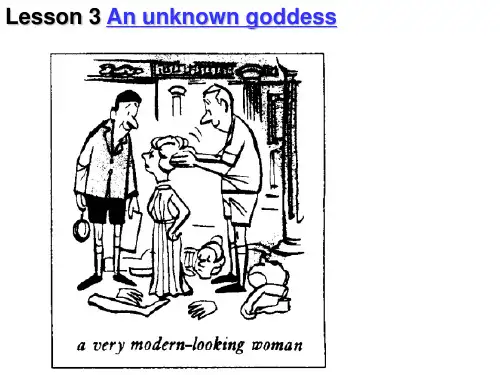
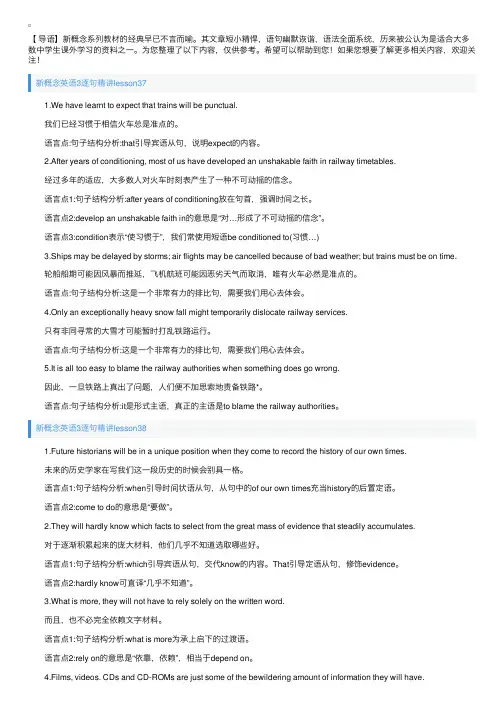
【导语】新概念系列教材的经典早已不⾔⽽喻。
其⽂章短⼩精悍,语句幽默诙谐,语法全⾯系统,历来被公认为是适合⼤多数中学⽣课外学习的资料之⼀。
为您整理了以下内容,仅供参考。
希望可以帮助到您!如果您想要了解更多相关内容,欢迎关注!新概念英语3逐句精讲lesson37 1.We have learnt to expect that trains will be punctual. 我们已经习惯于相信⽕车总是准点的。
语⾔点:句⼦结构分析:that引导宾语从句,说明expect的内容。
2.After years of conditioning, most of us have developed an unshakable faith in railway timetables. 经过多年的适应,⼤多数⼈对⽕车时刻表产⽣了⼀种不可动摇的信念。
语⾔点1:句⼦结构分析:after years of conditioning放在句⾸,强调时间之长。
语⾔点2:develop an unshakable faith in的意思是“对…形成了不可动摇的信念”。
语⾔点3:condition表⽰“使习惯于”,我们常使⽤短语be conditioned to(习惯…) 3.Ships may be delayed by storms; air flights may be cancelled because of bad weather; but trains must be on time. 轮船船期可能因风暴⽽推延,飞机航班可能因恶劣天⽓⽽取消,唯有⽕车必然是准点的。
语⾔点:句⼦结构分析:这是⼀个⾮常有⼒的排⽐句,需要我们⽤⼼去体会。
4.Only an exceptionally heavy snow fall might temporarily dislocate railway services. 只有⾮同寻常的⼤雪才可能暂时打乱铁路运⾏。
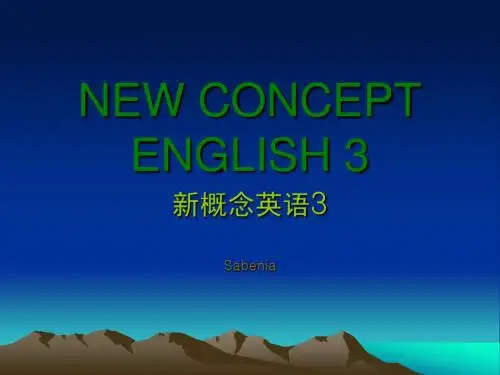
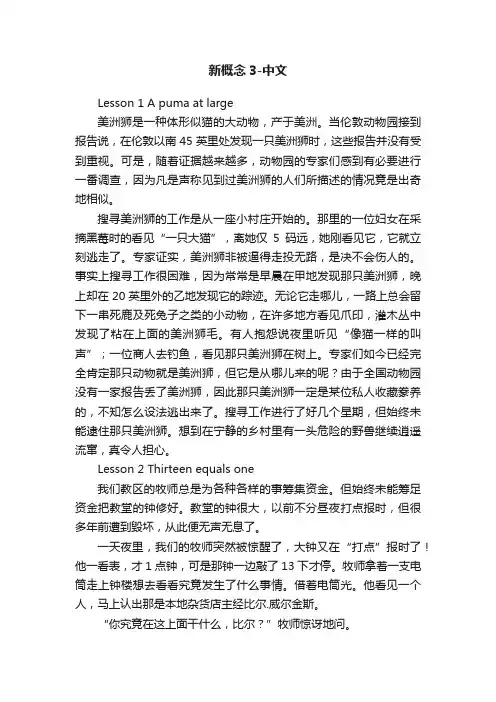
新概念3-中文Lesson 1 A puma at large美洲狮是一种体形似猫的大动物,产于美洲。
当伦敦动物园接到报告说,在伦敦以南45英里处发现一只美洲狮时,这些报告并没有受到重视。
可是,随着证据越来越多,动物园的专家们感到有必要进行一番调查,因为凡是声称见到过美洲狮的人们所描述的情况竟是出奇地相似。
搜寻美洲狮的工作是从一座小村庄开始的。
那里的一位妇女在采摘黑莓时的看见“一只大猫”,离她仅5码远,她刚看见它,它就立刻逃走了。
专家证实,美洲狮非被逼得走投无路,是决不会伤人的。
事实上搜寻工作很困难,因为常常是早晨在甲地发现那只美洲狮,晚上却在20英里外的乙地发现它的踪迹。
无论它走哪儿,一路上总会留下一串死鹿及死兔子之类的小动物,在许多地方看见爪印,灌木丛中发现了粘在上面的美洲狮毛。
有人抱怨说夜里听见“像猫一样的叫声”;一位商人去钓鱼,看见那只美洲狮在树上。
专家们如今已经完全肯定那只动物就是美洲狮,但它是从哪儿来的呢?由于全国动物园没有一家报告丢了美洲狮,因此那只美洲狮一定是某位私人收藏豢养的,不知怎么设法逃出来了。
搜寻工作进行了好几个星期,但始终未能逮住那只美洲狮。
想到在宁静的乡村里有一头危险的野兽继续逍遥流窜,真令人担心。
Lesson 2 Thirteen equals one我们教区的牧师总是为各种各样的事筹集资金。
但始终未能筹足资金把教堂的钟修好。
教堂的钟很大,以前不分昼夜打点报时,但很多年前遭到毁坏,从此便无声无息了。
一天夜里,我们的牧师突然被惊醒了,大钟又在“打点”报时了!他一看表,才1点钟,可是那钟一边敲了13下才停。
牧师拿着一支电筒走上钟楼想去看看究竟发生了什么事情。
借着电筒光。
他看见一个人,马上认出那是本地杂货店主经比尔.威尔金斯。
“你究竟在这上面干什么,比尔?”牧师惊讶地问。
“我想把这口钟修好,”比尔回答说。
“好几个星期了,我天天夜里到钟楼上来。
嗯,我是想让你大吃一惊。
”“你确实使我大吃了一惊!”牧师说,“也许同时你把村里所有的人都吵醒了。

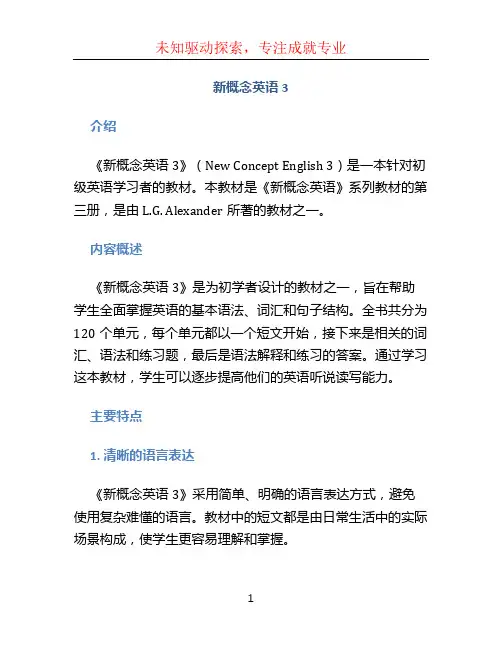
新概念英语3介绍《新概念英语3》(New Concept English 3)是一本针对初级英语学习者的教材。
本教材是《新概念英语》系列教材的第三册,是由L.G. Alexander所著的教材之一。
内容概述《新概念英语3》是为初学者设计的教材之一,旨在帮助学生全面掌握英语的基本语法、词汇和句子结构。
全书共分为120个单元,每个单元都以一个短文开始,接下来是相关的词汇、语法和练习题,最后是语法解释和练习的答案。
通过学习这本教材,学生可以逐步提高他们的英语听说读写能力。
主要特点1. 清晰的语言表达《新概念英语3》采用简单、明确的语言表达方式,避免使用复杂难懂的语言。
教材中的短文都是由日常生活中的实际场景构成,使学生更容易理解和掌握。
2. 重视语法学习本书致力于帮助学生掌握英语的基本语法知识和句子结构。
在每个单元中,教材都提供了相关的语法知识和例句,帮助学生理解和应用这些语法规则。
3. 综合练习和测试每个单元的课文后面都附有相应的词汇、语法和综合练习题。
这些练习旨在帮助学生巩固所学的知识,并检验他们的理解程度。
学习建议1. 定期复习为了更好地掌握教材内容,建议学生定期复习已学过的知识。
可以通过回顾教材中的例句和练习题,以及进行口语练习来加深记忆。
2. 多听多说英语是一门语言,需要通过不断的听说练习来掌握。
建议学生多听英语音频,模仿发音和语调,并多进行口语练习,与他人交流。
3. 创造实际应用场景学习英语需要与实际应用相结合,建议学生创造一些实际场景,例如模拟对话、写作练习等,以提高语言应用能力。
结论《新概念英语3》是一本适合英语初学者的教材,它不仅重视基本语法和词汇的学习,还通过实际场景的描述和练习题的设置,帮助学生全面提高英语听说读写的能力。
对于想要系统学习英语的人来说,《新概念英语3》是一个很好的选择。
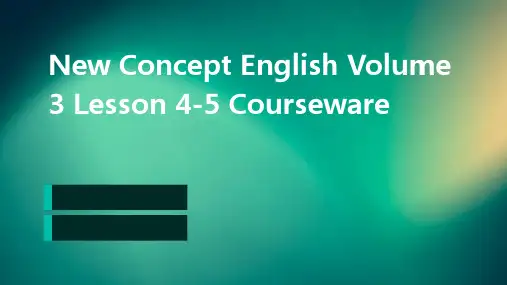
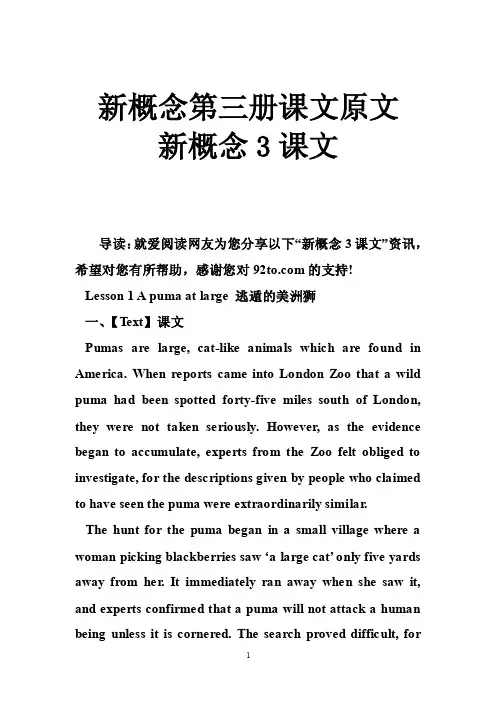
新概念第三册课文原文新概念3课文导读:就爱阅读网友为您分享以下“新概念3课文”资讯,希望对您有所帮助,感谢您对的支持!Lesson 1 A puma at large 逃遁的美洲狮一、【T ext】课文Pumas are large, cat-like animals which are found in America. When reports came into London Zoo that a wild puma had been spotted forty-five miles south of London, they were not taken seriously. However, as the evidence began to accumulate, experts from the Zoo felt obliged to investigate, for the descriptions given by people who claimed to have seen the puma were extraordinarily similar.The hunt for the puma began in a small village where a woman picking blackberries saw …a large cat‟ only five yards away from her. It immediately ran away when she saw it, and experts confirmed that a puma will not attack a human being unless it is cornered. The search proved difficult, forthe puma was often observed at one place in the morning and at another place twenty miles away in the evening. Wherever it went, it left behind it a trail of dead deer and small animals like rabbits. Paw prints were seen in a number of places and puma fur was found clinging to bushes. Several people complained of …cat-like noises‟ at night and a businessman on a fishing trip saw the puma up a tree. The experts were now fully convinced that the animal was a puma, but where had it come from? As no pumas had been reported missing from any zoo in the country, this one must have been in the possession of a private collector and somehow managed to escape. The hunt went on for several weeks, but the puma was not caught. It is disturbing to think that a dangerous wild animal is still at large in the quiet countryside.Lesson 2 Thirteen equals one 十三等于一一、【T ext】课文Our vicar is always raising money for one cause or another, but he has never managed to get enough money to have the church clock repaired. The big clock which used to strike the hours day and night was damaged many years ago and has been silent ever since.One night, however, our vicar woke up with a start: the clock was striking the hours! Looking at his watch, he saw that it was one o‟clock, but the bell struck thirteen times before it stopped. Armed with a torch, the vicar went up into the clock tower to see what was going on. In the torchlight, he caught sight of a figure whom he immediately recognized as Bill Wilkins, our local grocer.…Whatever are you doing up here Bill ?‟ asked the vicar in surprise.… I‟m trying to repair the bell,‟ answered Bill.‟ I‟ve been coming up here night after night for weeks now. You see, I was hoping to give you a surprise.‟…You certainly did give me a surprise!‟ said the vicar. …You‟ve probably woken up everyone in the village as well. Still, I‟m glad the bell is working again.‟…That‟s the trouble, vicar,‟ answered Bill. …It‟s working all right, but I‟m afraid that at one o‟clock it will strike thirteen times and there‟s nothing I can do about it.‟…We‟ll get used to that, Bill,‟ said the vicar. …Thirteen is not as good as one, but it‟s better than nothing. Now let‟s go downstairs and have a cup of tea.‟Lesson 3 An unknown goddess 无名女神一、【T ext】课文Some time ago,an interesting discovery was made by archaeologists on the Aegean island of Kea.An American team explored a temple which stands in an ancient city on the promontory of Ayia Irini.The city at one time must have been prosperous,for it enjoyed a high level of civilization.Houses--often three storeys high----were built of stone.They had large rooms withbeautifully decorated walls.The city was even equipped with a drainage system,for a great many clay pipes were found beneath the narrow streets.The temple which the archaeologists explored was used as a place of worship from the fifteenth century B.C. until Roman times. In the most sacred room of the temple, clay fragments of fifteen statues were found. Each of these represented a goddess and had, at one time, been painted. The body of one statue was found among remains dating from the fifteenth century B.C. Its missing head happened to be among remains of the fifth century B.C.This head must have been found in Classical times and carefully preserved. It was very old and precious even then. When the archaeologists reconstructed the fragments, they wereamazed to find that the goddess turned out to be a very modern-looking woman. She stood three feet high and her hands rested on her hip. She was wearing a full-length skirt which swept the ground. Despite her great age, she was very graceful indeed, but, so far,the archaeologists have been unable to discover her identity. Lesson 4 The double life of Alfred Bloggs阿尔弗雷德。
新概念英语英音版听力课程第三册
《新概念英语》是一套非常经典的英语教材,被广泛使用。
以下是《新概念英语》第三册的英音版听力课程,供您参考:
1. 课程目标:本课程旨在帮助学生掌握第三册的听力材料,提高听力理解能力。
2. 适用人群:本课程适用于已经学完第一册和第二册的学生,想要进一步提高英语听力水平的学生。
3. 课程简介:本课程包括12个单元,每个单元都有听力练习和听力理解测试,以及语音和发音练习。
学生可以通过听录音、做笔记、完成练习题等方式来学习。
4. 课程安排:本课程共分12周,每周学习一个单元。
每周的课程包括听力练习、语音和发音练习、听力理解测试等。
5. 课程特色:本课程采用英音版的《新概念英语》教材,注重听力训练和语音训练的结合,帮助学生提高英语听力水平。
6. 课程评价:本课程评价主要包括学生的听力理解能力和语音水平。
学生可以通过完成练习题和听力理解测试来评估自己的学习成果。
7. 课程建议:学生可以结合其他学习资源,如《新概念英语》的教材、听力材料、练习册等,进行更全面的学习。
同时,学生可以多听英语广播、英语新闻、英语电影等,提高英语听力水平。
总之,《新概念英语》第三册的英音版听力课程可以帮助您提高英语听力水平,增强听力理解能力和语音水平。
Lesson 41 illusions of pastoral peaceillusion [ɪ'lu:ʒn]n. 错觉illusion delusionbe / live under the illusion / delusion that …He is / lives under the illusion / delusion that he is always right.be under the impression that …Though the crew were at first under the impression that the lost ship had been found, the contents of the chest proved them wrong.breed [bri:d]v. 养育,培育breed bred breda well-bred childan ill-bred childborn and bredI was born and bred in China.I was China born and bred.I was city born and bred.I was country born and bred.bring up sb.raise sb.rear sb.rapture ['ræptʃə(r)]n. 极度的高兴,狂喜rapture > delight > joy / happinessbe in raptures / go into raptures about/ over/ at sth.She was in / went into raptures about her new house.extol [ɪk'stəʊl]v. 高度赞扬,盛赞extol the virtues / benefits of sth.He extolled the virtues of Internet technology.exalt eulogizepraise acclaima much acclaimed novelcomplimentcompliment sb. on sth.Everyone at the party complimented Mary on her new dress. superior [su:'pɪəriə(r)]adj. 优越的,优秀的,高级的He is a superior actor.be superior to …Your computer is far superior to mine.inferior be inferior to …senior be senior to …junior be junior to …prior be prior to …posterior be posterior to …cockcrow ['kɒkkrəʊ]n. 鸡啼,公鸡打鸣cockcrow cockroachMany girls are afraid / scared / frightened of cockroaches. crow cackle quack meow bark bleat bellow grunt neighroar chirp twitter warbleglint [glɪnt]v. 闪烁The dewdrops glint in the sunshine.sparkle glitterAll that glitters is not gold.flicker flash twinkle Twinkle, twinkle, little star, like a diamond in the sky.glowThe heated iron bar glowed.descend [dɪ'send]v. 下降,降临We descended the stairs.The plane started to descend.ascendbe descended from …descendantHe is descended from Confucius.He is a descendant of Confucius.descend on / upon …Millions of tourists descend on Beijing every year.Total silence descended on the room.A sense of complete helplessness had descended upon him.A double blessing has descended upon the house.Few things could be more impressive than the peace that descends on deserted city streets at weekends when the thousands that travel to work every day are tucked away in their homes in the country.obstinately ['ɒbstɪnətlɪ]v. 顽固地,固执地The old man is as obstinate as a mule.as stupid as a donkeyas busy as a beeas cunning as a foxas brave as a lionas proud as a peacockas poor as a church mouseas graceful as a swanstubborn headstrongdetermined resoluteappeal to sb.The idea never appealed to me very much, but one day, after a heavy shower, I happened to be walking in my garden when I noticed a huge number of snails taking a stroll on some of my prize plants.appealIn spite of national differences, certain funny situations have a universal appeal.The quiet life of the country has never attracted me. The quiet life of thecountry has never intrigued me. The quiet life of the country is not my cup oftea.City born and city bred, I have always regarded the country as something you look at through a train window, or something you occasionally visit during the weekend.Because / Since I was born and bred in the city, … Because / Since I was city born and bred, ……, I have always thought of the country as something ……, I have always considered the country something …I have no intimate knowledge of the country. 造句:因为是土生土长的中国人,我总是认为美国就是在好莱坞电影里看到的样子,或者偶尔在假期里看到的样子。
新概念英语第三册(共60课)Lesson1 A puma at largePumas are large, cat-like animals which are found in America. When reports came into London Zoo that a wild puma had been spotted forty-five miles south of London, they were not taken seriously. However, as the evidence began to accumulate, experts from the Zoo felt obliged to investigate, for the descriptions given by people who claimed to have seen the puma were extraordinarily similar.The hunt for the puma began in a small village where a woman picking blackberries saw 'a large cat' only five yards away from her. It immediately ran away when she saw it, and experts confirmed that a puma will not attack a human being unless it is cornered(adj.被困得走投无路的). The search proved difficult, for the puma was often observed at one place in the morning and at another place twenty miles away in the evening. Wherever it went, it left behind it a trail of dead deer and small animals like rabbits. Paw prints were seen in a number of places and puma fur was found clinging to bushes. Several people complained of 'cat-like noises' at night and a businessman on a fishing trip saw the puma up a tree. The experts were now fully convinced that the animal was a puma, but where had it come from ? As no pumas had been reported missing from any zoo in the country, this one must have been in the possession of a private collector and somehow managed to escape. The hunt went on for several weeks, but the puma was not caught. It is disturbing to think that a dangerous wild animal is still at large in the quiet countryside.美洲狮是一种体形似猫的大动物,产于美洲。
大家网新概念英语论坛
http://club.topsage.com/forum-73-1.html
2011新概念英语学习大全
http://club.topsage.com/thread-2408082-1-1.html
2011年最新出炉新概念英语全四册精华资源汇总(不断更新中……)
如何学好新概念英语??新人必读!!!
方法类:
《新概念》英语学习方法完全手册-学新概念英语必读
《新概念》英语的学习方法(完整版).doc
课本:
新概念英语 1-4册txt
文本 打包下载全套
新概念1-4册文本内容
TXT
新概念1至4册课文文本(中英文本+单词)
新概念英语教程完全手册 精美电子书
新概念英语教师用书全套程序版
[大家网首发] 新概念英语(
1)超级实用口语短句循环朗读速记—适合背诵的好材料
[大家网首发]新概念英语学习秘诀:90天背诵新概念最经典课文
156篇
课后练习答案及笔记:
[大家网首发]外研社全四册新概念英语练习详解电子书下载
(新版的详解)
新概念英语教师用书1-4册(pdf)新版
新概念英语1-4册笔记
新东方新概念英语资料:
新东方新概念笔记
自己搜集整理的新东方新概念课堂笔记
新东方新概念英语课堂讲解一到四册全
新概念英语名师精讲笔记第1册 新东方名师编写组编著
新概念英语名师精讲笔记第2册 新东方名师编写组编著
(新东方名师课堂)新概念英语名师精讲笔记第3册电子书下载
新概念英语名师精讲笔记第4册 新东方名师编写组编著
词汇和语法:
[大家网首发] 新概念英语全四册词汇详解
(新概念英语(新版)自学辅导丛书)
新概念英语语法详解大全 宋德伟等编著
水利水电出版社
新概念英语1-4册背诵单词
新概念英语全册词汇手册下载
新概念英语同步歌词(全四册)
新概念英语词汇3+2
快速记忆法——易学通词汇速记法研究中心编著
新概念英语词汇第四册托福雅思8000
词 新概念英语学习中心编
新概念英语词汇第三册四六级考研6500
词 新概念英语学习中心编
视听资源:
新版新概念英语全四册CD转128K高音质
mp3(美音版)下载
《有声E书:新概念英语(1-4册)》
新东方新概念网络课堂第1-4册
新东方《新概念英语教程[1-4
册](含文本\语音\FLASH》
【互动版新概念英语网络课程】【全4册】【新东方教育在线】
全套新东方新概念英语教程,有声电子书,MP3,学习笔记
,LRC歌词,补充教材整理下载
《新概念英语》【闭着眼睛记单词】
(初,中,高级)[MP3]
新概念英语共四册MP3教程附字幕电子书下载(容量小,内容丰富)
《新概念英语第一二册》[RMVB]
视频
《裕兴新概念英语名师精讲》比新东方新概念英语更加精细
新版新概念英语1-4册(英音+美音) [正版CD转MP3音质]
新版新概念英语全四册CD转128K高音质
mp3下载的歌词 [
新版新概念英语视频教程(全4册)下载汇总
新概念专用学习软件(共享免费版)
1985NCE全四册竹影无风英音版
< 新概念英语视频教程
>11.8G完整版
新概念英语1-4册美音版mp3
与Lrc
新概念英语1—4册词汇带音标
Excel版
扩展阅读:
新概念英语美文欣赏第1册——新概念英语学习中心编著
中国石化出版社
新概念英语美文欣赏第2册 新概念英语学习中心编著
新概念英语美文欣赏第3册 新概念英语学习中心编著
新概念英语美文欣赏第4册 新概念英语学习中心编著
新概念英语资料大集合
《新概念英语资料补充》配合新概念英语教程使用
新概念必背36篇彩底版(附重点词语标注)网络流传经典版
www.TopSage.com
www.TopSage.com
www.TopSage.com
www.TopSage.com
www.TopSage.com
www.TopSage.com
www.TopSage.com
www.TopSage.com
www.TopSage.com
www.TopSage.com
www.TopSage.com
www.TopSage.com
www.TopSage.com
www.TopSage.com
www.TopSage.com
www.TopSage.com